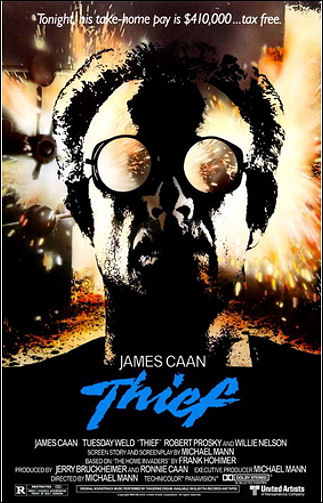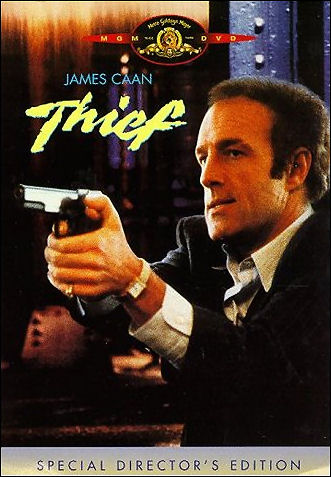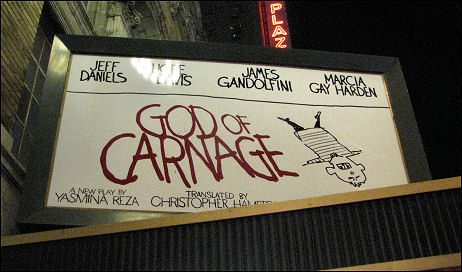Day: February 11, 2009
Cronenberg + Ludlum?
I was in a so-whatty frame of mind when I read earlier today about Tom Cruise and Denzel Washington reportedly being close to signing for The Matarese Circle, an updating of a respected 1983 Robert Ludlum thriller under director David Cronenberg. It would be the second high-velocity, internationally-flavored vehicle for Cruise on top of The Tourist, a remake of the French-produced Anthony Zimmer (’05) which Variety says will be his next project.
What’s in this for Cronenberg besides a fat paycheck? The man has always made films that have had some kind of extra thematic layer or undercurrent, or at least an application of kink. Read the synopses of the original ’83 Ludlum novel. Unless rewriters Michael Brandt and Derek Haas are radically departing from the book, there doesn’t seem to be anything in it other than straight plot. Is Cronenberg looking to be the next Paul Greengrass or ’90s-era Phillip Noyce? If so, that’s a switch.
It’s a good idea to beware, by the way, of anyone who had anything above-the-liney to do with Wanted, and in my book that means beware of Brandt and Haas. I realize that the ludicrousness of that Angelina Jolie thriller was partly due to the graphic-novel origins as well as the direction of that three-toed Russian sloth Timur Bekmambetov, who made this Universal release into one of the dumbest, most over-cranked action films of all time. But Brandt-Haas also wrote 3:10 to Yuma as well as 2 Fast 2 Furious. Make that caveat emptor plus.
All Nominees Considered
“I am a sucker for redemption stories, so I would have to say Mickey Rourke [for Best Actor]. I thought it was a vulnerable, stripped-down, raw and brave performance by somebody who has climbed his way out of what seems like a bottomless pit. It was an excellent performance. It really reminded me of all the things that I loved about Mickey Rourke in the early years, and part of that is just kind of a fearlessness to expose himself to whatever it takes to get the performance across.” — L.A. Times critic Betsy Sharkey in a 2.11 L.A. Times q & a conducted by Patrick Goldstein and also including Kenneth Turan, titled “Film experts reconsider the Oscar nominees.”
Lucas, Lucas, Lucas
A little sloppy for my tastes, two fart noises too many, and obviously about eight or nine months late. But decent. Thanks to Jack Morrissey, Peter Sciretta, Topless Robot, etc. The original posting was six days ago!
Not Enough
Real Geezers Marcia Nasatir and Lorenzo Semple, Jr. both respected but didn’t quite buy The Reader. (And they both think that Ralph Fiennes‘ first name is pronounced like Alf Landon‘s.) In as far as they probably represent the thinking of over-70 Academy voters to some extent, the combination of this and Ron Rosenbaum‘s Slate hit piece the other day suggests that the Slumdog Millionaire team needn’t worry too much.
Transition
HE’s server changeover — attempted yesterday, begun in earnest last night — isn’t completed yet, I noticed an hour ago, because when you try to click through to the full stories and commentary on the iPhone you get a message that says “page not found.” Hang in there, I’m told — it’ll all be jake by tonight or tomorrow.
Doc Dispute
In Contention‘s Kris Tapley is wondering if we’ve gotten “carried away” with the idea that Man on Wire will take the documentary feature Oscar. Well, that’s what truly exceptional films that deliver an exceptional mood and metaphor do, Kris — they carry you away. Tapley, however, feels “it might be the weakest of the five” and “may be the least likely to win an Oscar in two weeks’ time.”
I haven’t seen two of Man on Wire‘s competitors — Ellen Kuras‘s
They both began as shoot-and-let’s-see-what-happens docs, and feel somewhat removed for that. Because what emerged in both films, finally, is a collection of affecting moments more than a sense of a single unified thrust. They’re studies of particular locales and situations (i.e., New Orleans and Antarctica) — movies with emotional components and personalities, obviously, and yet fundamentally focused on ecological, meteorological and political disturbances. They both basically say “look at this, what a terrible shame, feel the pain.”
Man on Wire, clearly, is a much broader and a deeper piece about the enormous spiritual endeavor that goes into meeting and mastering any daunting challenge — a movie about art, obsession, determination and the beauty of ballet and balance and self-confidence. It’s a metaphor for what every artist faces as he/she starts out on a project. Art isn’t easy. It can be scary, terrifying. You don’t know what you’re doing half the time, and the feeling of “this is it, do or die” at the final moment of truth can be exhilarating or not, depending on your vision and your mettle. Man on Wire is about all this and more.
On a purely populist level, Man on Wire also has, obviously, an undercurrent of unspoken tragedy running all through it — never once referenced, not even anecdotally — and on some level people are going to vote for it because of this.
Encounters is very fine, yes, as well as Herzog’s first ever Oscar nomination, as Tapley points out. But just because Herzog’s masterful Grizzly Man was screwed out of a nomination before doesn’t mean that a payback situation is necessary or appropriate now. Encounters doesn’t have half the thematic heft of Grizzly, and it lacks a fascinating dysfunctional personality figure like Timothy Treadwell. Encounters is “personal” as far as Herzog’s observations are concerned, but it’s mainly a piece about travel and experience — nicely captured as far as it goes, but no Havana cigar.
Trouble the Water, for me, is not “the best film of the lot,” as Tapley maintains, but the most irritating because of that godawful hand-held video footage. I’ve been calling it “the King Kong of hand-held nausea jiggle movies” not because of the parts that were shot by Lessin and Deal in the usual fashion, but the footage of Katrina’s devastation captured by one of the film’s main subjects, Kimberly Rivers, with a little video camera. It’s so infuriating in its sloppy whip-pan frenzy that I was thinking about bolting less than ten minutes in when I first saw it at Sundance ’08. There is a universal law that says when you drive people crazy with this kind of thing that you can compete for and perhaps win some minor second-tier awards, but you can’t win an Oscar. And I didn’t write this law, God did, so don’t blame me.
Put this together with my other judgments about Trouble the Water and you have a decent, respectable effort but that’s all.
Oh, Yeah?
Writing from Berlin , Variety‘s often contrarian, occasional sour-puss critic Derek Elley has taken a leak on Stephen Frears‘ Cherie. So you can either dial down the buzz a notch or two, or at least accept that there will be an argument of sorts when it opens stateside, as opposed to universal acclaim.
“…That Mental Attitude”
The late-night diner scene in Michael Mann‘s Thief — the best 9 minutes and 55 seconds that James Caan ever delivered, bar none. I found this clip after reading a 2.9.09 essay about this landmark 1981 film by KirbyDots’ Tristan Eldritch. Read it, watch the clip, and then start holding your breath while waiting for a Blu-ray version to appear. The last Thief DVD, released more than ten years ago, was okay, nothing more.
“Thief concerns an accomplished safe-cracker and ex-convict named Frank,” Eldritch writes. “Working independently with a small crew of trusted friends, Frank is a highly successful jewel thief who operates both a bar and a used-car lot as fronts. In terms of character, Mann develops Frank as a brilliant case study in how people are conditioned and shackled by past experience. Frank has already been traumatized by his childhood, in state-run orphanages, but it is his years in prison which ultimately define his personality.
“While incarcerated, he developed as a survival technique the ability to attain at will a state of almost Zen-like self-negation; a condition of complete emotional dislocation which divests his life and personality of all meaning, but nevertheless renders him fearless and psychotic enough to survive in a harsh and violent environment.
“This is, in many respects, a more extreme version of the austere survival discipline Neil McCauley has adopted in Heat: ‘Do not become attached to anything that you can’t drop in thirty seconds flat, when you see the heat coming around the corner.’
“The other chief pivot of Frank’s character, also developed in prison, is the postcard sized photo collage he has made as a symbolical representation of his dream of a better life. Despite his obvious affinities with the world of criminality, and his obsessive dedication to his craft as a thief, Frank longs for a life of domestic tranquillity and security, and his collage depicts all the trappings of this ideal: wife, children, and leafy suburban house and garden.

“Frank’s collage encapsulates what is both sympathetic and unnerving about his character, in that it illustrates the sincerity of his desire for a better life, coupled with an almost sociopathic belief that an idea can be pursued in a single-minded fashion, with no recourse to the complexities and contingencies of real life. A fatal aspect of Frank’s individualism is that he sees the world unfailingly as an extension of his own will, and thus when he sets about attaining his domestic ideal, he does so with almost the same degree of mechanical simplicity with which he has assembled the collage.
“It is worth noting that as much as Mann’s films deal with characters that identify to a compulsive degree with their vocation or career, the characteristic malaise of a Mann protagonist is actually the longing to escape that vocation.
“Frank has been dating a down-to-earth waitress named Jessie (Tuesday Weld), and plans to marry her and have children. He has promised that his criminal career will shortly come to an end, believing himself, in the archetypal style of so many sympathetic criminals in noir thrillers, to be a couple of big scores away from retirement. In his haste to actualise this retirement dream, he reluctantly starts working for a gangster called Leo. Thereby the chief momentum of the plot kicks in, predicated on Frank simultaneously setting up a big score for Leo, and organising his future life with Jessie.
“The problem, however, is that Frank’s life, both domestically and professionally, becomes increasingly and inextricably bound up with Leo. When Frank and Jessie are unable to adopt a child, Leo intervenes and provides a mother who is prepared to sell them her child. Meanwhile, Frank discovers that working for Leo has brought him to the attention of the police, who demand a cut of the take from the robbery.

“In some respects, Thief could be read as an extreme parable about the struggle between individualism and society. It’s Frank’s desire to lead an ordinary, family-based life which leads to his Mephistophelian pact with Leo, and the beginning of the complete erosion of his status as an independent, self-governing operator.
“The deal with Leo is a kind of extreme version of a social contract; Frank gets a home and a family, but with them comes a boss, and a fatal entanglement within a corrupt system of bribes and mutual favors; the system, according to both criminals and cops, of ‘how things are done.’ Leo changes from being a kindly and paternal figure to one of pure malevolence, asserting aggressively that he ‘owns’ Frank. Frank, in turn, realizing finally that he cannot achieve his dream on his own terms, falls back on the mental habits he acquired in prison. He dispassionately disassembles his long cherished dream, piece by piece, in an extraordinary eruption of sustained, cathartic violence. He cuts Jessie and their child completely from his life, sets fire to his businesses, and kills Leo.
“The question remains, however, after Frank has vanished into the dark horizon of the film’s denouncement, to what extent Mann intends Frank’s complete lack of compromise to represent a heroic apotheosis, or the self-defeating actions of a character that is psychologically damaged by his past.”
In my head, the movie delivers both themes simultaneously. The superficial, easy-to-roll-with interpretation is that Caan’s Frank is one of the ultimate hardcase movie badasses of all time. The deeper, ground-level read is that he’s an impossible purist whose bruised psychology has made him incapable of working with ‘the way things are done’ and therefore a tragic figure from the get-go. This fatalistic, fuck-all element is one reason why women have never liked this film (Pauline Kael raked it over the coals) and why it’s one of the all-time great guy films. You either get the take-it-or-leave-it duality or you don’t.
Carnage Approaching
According to a 3.26 review of the London production of Tasmina Reza‘s God of Carnage, which starts previewing here on 2.28, it “savagely rips to shreds the pretensions of the liberal middle class.” I’ve read about the London run, walked by this 45th Street marquee last night, and am figuring that any play with Jeff Daniels, Marcia Gay Harden, James Gandolfini and Hope Davis must have exceptional chops and content.

On top of which a straight play that the tour-bus crowd won’t be flocking to (at least not initially) is right up my alley.
The setting, says the Herald Tribune/AP review, is “the comfortable home of a 40ish couple (Davis and Daniels, I’m guessing), and their uncomfortable guests are another couple (presumably Gandolfini, Harden), whose 11-year-old son has bashed their host’s son with a stick, knocking out two teeth.
“The couples hope to resolve the situation amicably; they are deluded. Before long, their mild discomfort and unease have exploded in a torrent of anger, fear, jealousy and rage. There is drinking, fighting, vomiting and the destruction of tulips,” all of basically feeds into “a living-room Lord of the Flies.
“Reza’s plays have a serious thesis: liberal ‘civilization’ is wafer thin and we are all savages underneath. She insists her works are tragedies, not comedies.
“Whether this is profundity or philosophy-lite is debatable. It is, perhaps, typically British that in Christopher Hampton‘s punchy, fluent translation, the fury is played for laughs. Comedy or tragedy, God of Carnage is an expert piece of stagecraft, and savagely funny.”

